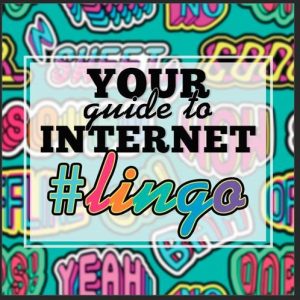Considering how much time we all spend online, it is not surprising that the Internet has developed a language of its own. The cornerstone of Internet lingo is to say as much as you can in as little space as possible, whether that is with shorter words or a simply using abbreviation.
This shortened, abbreviated internet language usually leaves little room for explanations, and to the untrained eye it can seem like nothing more than mumbo jumbo . Plus, it’s constantly changing! The Internet is always looking for shorter, funnier, or more interesting ways of communicating.
This random and ever-changing way of communicating makes it easy for some people to get left behind.
Just when you finally figure out the meaning of LOL, teenagers on Facebook start posting ‘I can’t even!” everywhere.
Does that mean you can only odd? You might wonder. What does it mean to? Why can you not even? What’s the difference?? And suddenly, you’re lost again.
Now you can stay ahead of the curve with this Guide to Modern Internet Lingo!
Most popular internet abbreviations
JK Just kidding!
LOL Laugh out loud. Will commonly be the response to a joke.
ILY I love you.
OMG Oh my gosh!
YOLO You only live one!
OFC Of course
NVM Never mind
NBD No big deal
IDK I don’t know
LMK Let me know.
NGL Not gonna lie.
SMH Shaking my head. References shaking your head in annoyance or frustration.
DM Direct message. Indicates you want to have a private conversation.
HMU Hit me up. Aka get in touch or call me .
FOMO Fear of missing out. Example: I’m really don’t enjoy bowling. But all my friends are going and I have major FOMO, so I’ll go anyways.
IRL In real life. As in, NOT on the internet!
TBH To be honest.
Cray Crazy!
NSFW Not safe for work. This is a warning that you should wait until you’re home, or at least somewhere private, before opening that video/image/article/content!
RT or Retweet Retweet means to repost or forward a message (aka a Tweet) on Twitter. It is also said as a way to indicate approval or agreement with something.
BTW or By the way
Most popular internet terms
Ship A fictional relationship that you love/support, usually from a TV show, movie, or book.
OTP One True Pairing. Your FAVORITE ship.
Bae Term of endearment, usually for a significant other.
Aesthetic Your style or your vibe.
Noob Someone who is new to or inexperienced in a certain area.
Extra Too much or over the top.
Selfie A photo taken of yourself using a front-facing camera.
Emoji A photo icon used to show an expression or a feeling. The best part of emojis is that they require NO words to convey meaning!
Photobomb When someone unexpectedly jumps into a photograph they weren’t meant to be in.
Trending Popular, in fashion, or talked about. Twitter, for instance, has a Trending section where you can see what topics are being Tweeted about the most at any given time.
# or Hashtag Adding a hashtag to an online post (blog, Tweet, Facebook or Instagram post, etc) indicates what TYPE of content it is, allowing users to more easily find specific content. Putting the # symbol before keywords, written without spaces, creates a hashtag, or a searchable link. For instance, adding #DisneyWorld to your picture will allow it to come up in the results if another user searches #DisneyWorld.
Troll Someone who enjoys starting online arguments and/or riling people up. Trolls will leave comments and responses specifically meant to get a rise out of people. Trolling has also become a verb, meaning intentionally being argumentative . As the saying goes, don’t feed the trolls!
Why does language exist?
Some would argue that internet lingo wrong.
At its most basic level, language exists to promote communication and understanding. The rules of spelling and grammar were invented by humans. As humans evolve, so must language, and so must our strict rules for what is and is not acceptable language.
In the spirit of allowing modern culture to dictate language, rather than tradition, dictionaries have actually begun to include Internet slang. Particularly the ones that have become too ingrained in society to ignore. For example, “selfie” is part of Merriam-Webster. “LOL” is on Dictionary.com.
In 2015, the Oxford Dictionary Word of the Year was the ‘Face with Tears of Joy’ emoji. That’s right. It wasn’t a word at all, but an emoji that best reflected the moods and communications of that year. 

To receive FREE phone service, you first must be approved through the National Verifier. You can bring your own phone and keep your number to experience our 5G network coverage. We will ship you a FREE SIM Card Kit so you can get UNLIMITED talk & text if you already participate in government programs such as SNAP and Medicaid. Once approved, you can begin the phone activation process to receive FREE phone service online.
So forget the rules! Now that you’re an internet lingo pro, feel free LOL and OMG to your heart’s content!





